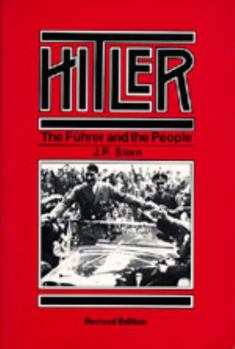Hitler: The Führer and the People
Professor Stern seeks to expose the roots of the Hitler myth. He performs thoroughly and brilliantly the examination that Kenneth Burke saw as a crying need on the brink of World War II. The questions Professor Stern asks are fundamental and still of the first importance in our own society. How could a predominantly sober, hardworking, and well-educated nation be persuaded to follow Hitler and his inhuman and destructuve program? What was the source of his immense popularity? Why were his public utterances so powerfully persuasive? What were the shared assumptions behind "The Final Solution," Operation Barbarossa, "The Night of the Long Knives"?
Professor Stern has done a pioneering study of the rhetoric of Nazism, a rhetoric that coupled words and action. He examines the speeches, writings, and conversations of Hitler and places them in the context of traditional beliefs of the society into which Hitler, the "ideal outsider," made his way. With terrifying logic his career emerges as the creation of a man who translated the private sphere of sentiment into the public sphere of political action, the will to power into a weapon of mass hypnosis.
Professor Stern has done a pioneering study of the rhetoric of Nazism, a rhetoric that coupled words and action. He examines the speeches, writings, and conversations of Hitler and places them in the context of traditional beliefs of the society into which Hitler, the "ideal outsider," made his way. With terrifying logic his career emerges as the creation of a man who translated the private sphere of sentiment into the public sphere of political action, the will to power into a weapon of mass hypnosis.
Format:Paperback
Language:English
ISBN:0520029526
ISBN13:9780520029521
Release Date:July 1975
Publisher:University of California Press
Length:254 Pages
Weight:0.66 lbs.
Dimensions:0.7" x 5.5" x 8.2"
Related Subjects
Europe Germany History Military Politics & Government Politics & Social Sciences World World War IICustomer Reviews
1 rating
Brilliant and Unique
Published by Thriftbooks.com User , 15 years ago
I was astonished to see this book hasn't been reviewed already - it's been out and widely used by scholars since 1975 and offers more thoughtful analyses of the Hitler phenomenon in its gracefully written 200 pages than any of the massive, obsessively detailed volumes that keep rolling off the presses. Born in Prague, Stern served in the Czech Army and the RAF during WWII and went on to a stellar academic career with nine well-reviewed publications the last time I looked. In this one, he does a brilliant, compelling job of reconstructing the whole personal-social-cultural-philosophical concatenation that enabled and sustained National Socialism. Methodology ranges from Anglo-American speech-act theory (Ch. 4, "Propaganda as Perlocutionary Act" is just stunning in its import and contemporary relevance)to a kind of critical phenomenology that evokes the immediate life-world of the time and probes the questions of origin and coherence with the imagination and patience of a poet-philosopher. Not even the gifted diarists of this period, like Klemperer and Moltke, convey "what it felt like" so convincingly. This revised 1990 edition makes good use of the 1986 "Historikerstreit" among German revisonists, the notorious case of David Irving and Hugo Ott's depressing 1988 Heidegger biography, and includes the moving introuction to the samizdat Czech edition. Like Stern, some of the best analysts of the Hitler phenomenon are the ones who knew it eye-to-eye: Conrad Heiden in Der Fuehrer and even the much-maligned Hermann Rauschning in The Revolution of Nihilism. (Ron Rosenbaum's Explaining Hitler is a smart contemporary overview and less painful to read by virtue of its distance from events.) In the end, though, I'd put this at the head of the reading list for anyone seeking a wise and humane guide to the tragedy and lessons of the Hitler era.





